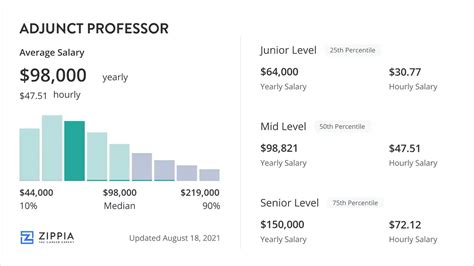For professionals with deep industry knowledge or academics seeking flexible teaching roles, becoming an adjunct professor offers a rewarding opportunity to shape the next generation of talent. It's a career driven by a passion for education and a desire to share expertise. But what does compensation look like for these vital part-time faculty members?
Navigating the world of adjunct salaries can be complex, as it rarely fits the mold of a traditional annual salary. While earnings vary significantly, the typical pay for a single, semester-long course often falls between $3,000 and $6,000. This guide will break down the compensation structure, the factors that influence your earning potential, and the overall career outlook for this profession.
What Does an Adjunct Professor Do?

An adjunct professor, also known as a contingent or part-time faculty member, is a non-tenure-track instructor hired by a college or university to teach on a limited-term contract. These contracts are typically for a single semester or academic year and are renewed based on departmental need.
Unlike full-time, tenured professors whose roles encompass teaching, research, and extensive administrative service, an adjunct's responsibilities are primarily focused on teaching. Core duties include:
- Developing a course syllabus and lesson plans.
- Delivering lectures, leading discussions, and facilitating labs or studios.
- Creating and grading assignments, quizzes, and exams.
- Holding office hours to provide students with academic support.
- Managing the course's online learning portal (e.g., Canvas, Blackboard).
Adjuncts are the flexible workforce of higher education, bringing real-world, current industry experience into classrooms, especially in vocational and professional fields.
Average Adjunct Professor Salary

The most critical thing to understand about adjunct compensation is that it is almost always calculated on a per-course or per-credit-hour basis, not as a fixed annual salary. This means an adjunct's total income depends directly on how many courses they are contracted to teach each semester.
According to a 2022-2023 report from the American Association of University Professors (AAUP), the average pay per three-credit course was approximately $3,894. However, this figure can be misleading due to the wide range of pay scales.
- Per-Course Salary Range: A more realistic range is between $2,500 for a course at a community college or in a lower-paying field, to upwards of $7,000 or more for a specialized graduate-level course at a prestigious private university.
- Annualized Income Estimates: Salary aggregators attempt to convert this into an annual figure, which can be helpful for comparison but assumes a consistent course load.
- Salary.com reports the average U.S. salary for an Adjunct Professor is $89,683 as of May 2024, but this figure often includes professionals teaching highly specialized, lucrative courses and may not reflect the median experience.
- Glassdoor places the estimated total pay for an adjunct professor at around $62,176 per year, based on user-submitted data, which includes a base pay estimate of $55,528.
Important Caveat: The U.S. Bureau of Labor Statistics (BLS) groups all "Postsecondary Teachers" into one category, reporting a median annual wage of $84,380 in May 2023. This number is heavily skewed by the salaries of full-time, tenured, and tenure-track faculty and should not be considered representative of typical adjunct income.
Key Factors That Influence Salary

Your earning potential as an adjunct professor is not static. It is influenced by a combination of your personal qualifications and the characteristics of the hiring institution.
Level of Education
Your terminal degree is a primary determinant of your pay. A candidate with a Ph.D. or another terminal degree (e.g., an M.F.A. in creative arts, an Ed.D. in education, or a J.D. for law courses) will command a higher per-course stipend than a candidate with a Master's degree. For technical and community colleges, a Bachelor's degree combined with significant, relevant industry experience may be sufficient for some roles, but this will correspond with the lower end of the pay scale.
Years of Experience
Experience matters in two key ways. First is teaching experience; an adjunct with a proven track record of successful teaching and positive student evaluations may be able to negotiate a slightly higher rate or be given preference for higher-enrollment courses. Second, and often more impactful, is professional industry experience. A cybersecurity executive with 20 years of experience teaching a graduate course will earn far more than a recent graduate teaching an introductory course, as their real-world expertise is a valuable asset to the university.
Geographic Location
As with most professions, location plays a major role. Institutions in major metropolitan areas with a high cost of living (e.g., New York City, San Francisco, Boston) must offer higher stipends to attract qualified instructors. For example, teaching a course in a rural Midwestern town might pay $2,800, while the exact same course at a university in a major city could pay $4,500. State funding for public universities is also a factor, with pay scales often varying from one state to another.
Institution Type
The type of institution you work for is one of the most significant factors in determining pay. There is a general hierarchy:
- Private, Well-Endowed Universities (e.g., Ivy League): These institutions typically offer the highest per-course rates.
- Major Public Research Universities (R1/R2): These universities also tend to pay well, especially for graduate-level courses.
- State Colleges and Regional Universities: Compensation is often moderate and can be heavily dependent on state legislative funding.
- Community Colleges: While they provide the most teaching opportunities for adjuncts, they also tend to be at the lower end of the per-course pay scale.
- For-Profit Universities: Pay at these institutions is highly variable and can range from competitive to below average, depending on the company's business model.
Area of Specialization
Market demand dictates value. Adjuncts in high-demand, high-earning fields will receive much higher compensation than those in less market-driven disciplines.
- High-Paying Fields: Business (especially finance and marketing), Law, Computer Science, Data Science, Engineering, and Nursing are in high demand. Professionals in these areas are often recruited from lucrative private-sector jobs, and universities must offer competitive pay to attract them.
- Lower-Paying Fields: Humanities (English, History, Philosophy) and some Social Sciences, while academically crucial, typically have a larger supply of qualified instructors (many with Ph.D.s) and therefore command lower per-course stipends.
Job Outlook

The career outlook for postsecondary teachers is strong, though this comes with important context for adjuncts.
According to the U.S. Bureau of Labor Statistics (BLS), overall employment for postsecondary teachers is projected to grow 8 percent from 2022 to 2032, which is much faster than the average for all occupations. The BLS anticipates about 118,800 openings for postsecondary teachers each year, on average, over the decade.
A significant portion of this growth is expected to be filled by adjunct and other non-tenure-track faculty. As universities continue to seek budgetary and staffing flexibility, the demand for part-time instructors to handle fluctuating enrollment and teach specialized subjects will remain robust.
Conclusion

An adjunct professor role can be an immensely fulfilling way to share your passion and knowledge. However, it's essential to approach it with a clear understanding of the unique compensation structure.
Key Takeaways:
- Think Per-Course, Not Annually: Your income is determined by the number of courses you teach each semester.
- Your Value is Specific: Your earning potential is highest if you possess an advanced degree and professional experience in a high-demand field like technology, business, or healthcare.
- Institution Matters: Pay scales differ dramatically between community colleges, state universities, and elite private institutions.
- It's a Growth Area: The demand for part-time faculty is strong and expected to continue growing, providing ongoing opportunities.
For those considering this career path, an adjunct position offers unparalleled flexibility and the deep satisfaction of mentoring students. By strategically leveraging your education, experience, and specialization, you can successfully navigate this vital corner of the academic world.
